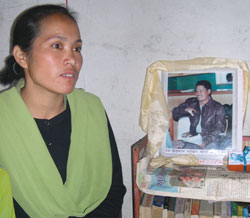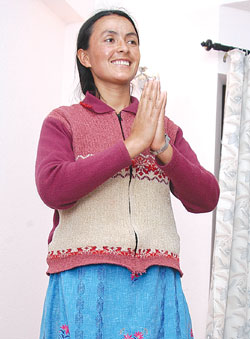|
|
| SO NEAR YET SO FAR: Shanti Pakhrin and Devi Khadka are both MPs from Dolakha. Pakhrin has not spoken to Khadka yet about her husband\'s murder by Maoists. |
Shanti Pakhrin, 28, is a UML MP from Dolakha. She shares a small rented room with her nine-year-old daughter and two sisters-in-law in a modest, crowded Kathmandu neighbourhood. Dominating the dim, cramped space mostly taken up by two beds is a garlanded photograph of Shanti's late husband, Buddhi Man, which sits atop a cupboard.
A few kilometres away, in a more posh part of town, lives Maoist MP Devi Khadka. The contrast between the living situations of the two women is hard to miss. The five-storeyed building that houses the Maoist women MPs is elaborately painted and frescoed, and we walk up marble stairs to Khadka's room on the third floor. Her quarters are cheerful: sunny, freshly-painted, with a recently-laid carpet.
The two women are the same age, from the same district and, now, are both parliamentarians. But the connection between them is far deeper-and more bitter-than these facts let on.
On the night of 25 November 2002, as Buddhi Man Pakhrin was getting ready for bed, a knock came on the door. Pakhrin, a UML activist and chair of Dolakha's Thulopatal VDC, was asked by three Maoist cadres-'Avinash', 'Kiran', and 'Srijana'-to immediately come away with them for a meeting.
Pakhrin never returned home to his wife, then pregnant with their third daughter, and his children. A week later a villager found his dead body an eight-hour walk away. Pakhrin had been dragged across fields and rocky trails, his body was bloody, bruised, and covered with cuts and burn marks. Nails had been hammered between his fingers.
At this time, Khadka was the Maoist district secretary for Dolakha. Today she and Pakhrin sit in the same legislative chamber when parliament is in session. Pakhrin says her relationship with Khadka is "civil"-she has never confronted her. In fact, says Pakhrin, they have only talked once.
The irony is, says Pakhrin, that she and her husband, staunch leftists, had real sympathy for the Maoist cause. "Until they took my husband, I truly thought the Maoists' ideology was good and that they were fighting evil," says Pakhrin. "I never thought for a moment that they would kill him like that."
But soon after her husband's death, Pakhrin realised that he had been resisting Maoist pressure for a long time. Buddhi Man Pakhrin's few years of chairmanship of Thulopatal VDC had brought a number of positive developments-he had lobbied successfully for running water, the opening of schools, and the building of bridges. On the side, he had also been refusing Maoist demands for a share of the VDC's development funds.
|
|
Khadka's is a typical story of a highly motivated-and highly persecuted-'revolutionary'. When just in her teens, she was founding chair of the Maoist-affiliated All Nepal Women's Association (Revolutionary). In 1997 came the experience that radicalised her even further. Khadka was arrested and disappeared for 28 days. She then spent four months in police custody where she was repeatedly raped. Two years later she was a PLA commander, first for Dolakha and Sindhupalchok, and then Dolakha, Okhaldhunga, and Solu Khumbu. She rose swiftly through the ranks to become the Maoist Dolakha district secretary in 2002.
When asked directly about the torture and murder of Buddhi Man Pakhrin, Khadka says simply, "He was an informer and killed by party's orders." Press her and she answers defensively that UML informers caused the death of 15 of her comrades in Dolakha.
"I understand what it is like to lose family members," she says, adding that she wished that fewer people had died in the war. Before this can sink in, though, she hastily adds, "That doesn't mean we regret having fought the people's war."
But Pakhrin is not looking for an apology anyway. She wants closure. "I want whoever gave the order that my husband be killed, to stand up and take responsibility."
The Maoists have never made an official public statement or taken responsibility for Buddhi Man's killing. Pakhrin says she met 'Avinash' a couple of years later and confronted him. "We did not take Buddhi sir away to kill him," he answered. "I gave up my bed so he did not have to sleep on the floor, there was an order from the party that he be questioned, and he died during the course of investigation."
Why is Pakhrin not pressing the matter in parliament or when she sees Khadka? "Bringing up such issues now could jeopardise the peace process," she argues.
"When you are a representative of the people, you are not an individual anymore. You cannot let emotions rule you."
Khadka steers the conversation far from the realms of feeling and empathy. Instead, she speaks to us about the challenges the party has had to face since leaving the jungles and warns of outside interference. Like many of the party's demagogues, she makes it sounds as of the threat of external forces was the major obstacle to peace-which the Maoists have "always wanted."
As we are leaving, Khadka tells us: "There was a time when we'd look at the lights of Kathmandu from the Mahabharata and Sailung hills. It's so different to actually be here. still, we're glad to not be fighting the war, we didn't want to be in the jungles forever."
Individual Maoists like Devi Khadka might be in peacetime mode now, out of the jungles of war. But they are not yet out of other, more murky woods. Shanti Pakhrin, more outspoken than many, is keeping her counsel for now. But she says, "when I speak, it will be for all the women who lost their husbands in the war." Then she will insist on being heard.




